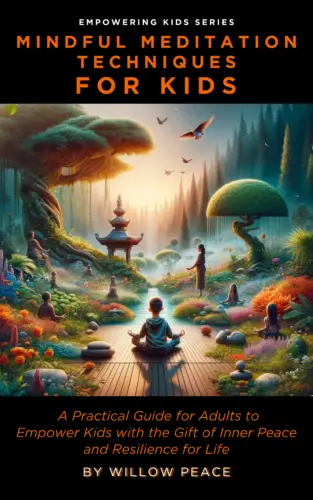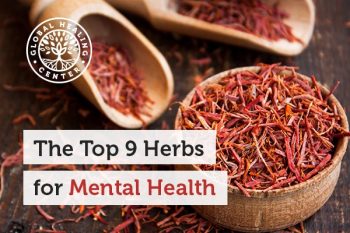Guest writer for Wake Up World
Ever find yourself unable to remember what you did just two minutes ago? Or maybe you experience brain fog more often than you’d like. These days it seems to happen more frequently to all of us. Information overload, stress, and even the assortment of environmental toxins which assault us on a daily basis can impact brain function. While I recommend diet, exercise, and reducing electronic activity as the best ways to get the brain back to working order, sometimes we need a little help to restore mental balance. The following nine herbs have a traditional history of promoting mental health.
Herbs for Mental Health
1. Mulungu Bark
The indigenous people of South and Central America have used mulungu for centuries to calm nerves, improve mood, and aid sleep. Erythravine, one of mulungu’s active alkaloids, may also help reduce anxiety and protect brain function.[1, 2] Flavonoids present in this herb are known antioxidants and have been shown to support cardiovascular health and a healthier brain.
2. Bacopa
Commonly known as Brahmi, Ayurvedic medicine relies on bacopa to improve memory, reduce stress, and support cognitive function. Researchers observed cortisol — the body’s stress hormone– decreased in study participants who took bacopa compared with those taking a placebo.[3] Additional research indicates it may support the physical health of brain cells and offer some protection against brain aging.[4]
3. Mucuna Pruriens
Mucuna contains L. dopa, a biochemical precursor to several neurotransmitters. One of those neurotransmitters is dopamine, and supporting dopamine levels may improve brain function and support memory. This effect probably contributes to Mucuna’s popularity as an anti-aging herb. Antioxidant properties linked to Mucuna also discourage damage from free radicals and suggest protective effects for neurons.[5]
4. Rhodiola rosea
This traditional medicinal herb contains two powerful natural compounds that have been proven to play a role in brain health. Salidroside is one of these compounds and is known as a potent antioxidant. Rosin is the other, and this compound appears to reduce inflammation of neural cells, possibly protecting against neurotoxicity.[6] The results of one Swedish study showed that both of these compounds reduced fatigue, improved mood, and lowered the effects of stress.[7] This may lead to better mental performance and a more positive response to stressful situations.
5. Zizyphus jujuba
Also known as “sour date,” Zizyphus jujuba is one of the many herbs that may support mental health while encouraging a good night’s rest. Day-to-day activities can be draining on energy levels, not to mention mental strength. The plant’s saponins have demonstrated sedative effects on animal models, possibly supporting relaxation.[8]
6. Passionflower
This traditional herbal sedative has been used as a sleep aid for years. Passionflower also appears to help relieve anxiety, a major cause of sleep disturbance for many individuals. Without a good night’s sleep, mental acuity is compromised and memory degrades. Initial studies indicate that small servings of passionflower in a tea help healthy adults experience more restful sleep.[9]
7. Scutellaria lateriflora (Skullcap)
Native to North America, this plant has a history of use for calming nerves, easing stress, lifting the mood, and aiding sleep. Research suggests it possesses mood enhancing effects and its antioxidant properties may provide significant protection for the brain against the damaging effects of inflammation.[10, 11]
8. Kava
The clear oceans and sandy beaches of the South Pacific may be ideal for reducing stress and promoting relaxation. For those of us unable to get there, kava may offer an alternative experience. Used traditionally to relieve stress, anxiety, and poor sleep, kava contains compounds known as kavalactones. These compounds offer a non-opiate and non-narcotic means to supporting a good mood. Some studies indicate kavalactones perform as well as certain pharmaceutical drugs.[12]
9. Saffron
Saffron, also known as Crocus sativus, does more than add color and flavor to food. It has a long history of use for encouraging a balanced mood, relieving stress, and calming anxiety. Studies have found it very effective for lifting mood, significantly outperforming placebo in clinical trials.[13]
Further Approaches to Brain Health
Herbs aren’t the only way to keep the brain sharp and running smoothly. Lithium and zinc are two naturally-occurring minerals that support memory, focus, and overall health.
Lithium Orotate
Lithium orotate supports a positive mood and positive responses to stress. Studies have shown it to support grey matter in the brain.[14] Unlike other forms of lithium, lithium orotate easily passes through cell walls for greater bioavailablity.
Zinc Orotate
Dr. Hans Nieper discovered zinc orotate was more easily assimilated by the human body. This neutrally-charged form of zinc crosses cell membranes, getting where it’s needed most to support hormone production and balance, metabolism, tissue growth, and nerve function.
Promoting Mental Health
For mental health support, it’s hard to beat rest, sleep, and exercise; they remain the best places to start for reducing feelings of fatigue and mental cloudiness. Sometimes the body needs help to restore balance and find shelter from environmental toxins.
Have you tried any of these herbs? How well did they work for you? Please share your experience with us in the comments!
References:
- Flausino OA Jr, Pereira AM, da Silva Bolzani V, Nunes-de-Souza RL. Effects of erythrinian alkaloids isolated from Erythrina mulungu (Papilionaceae) in mice submitted to animal models of anxiety. Biol Pharm Bull. 2007 Feb;30(2):375-8.
- Santos Rosa D, Faggion SA, Gavin AS, Anderson de Souza M, Fachim HA, Ferreira dos Santos W, Soares Pereira AM, Cunha AO, Beleboni RO. Erysothrine, an alkaloid extracted from flowers of Erythrina mulungu Mart. ex Benth: evaluating its anticonvulsant and anxiolytic potential. Epilepsy Behav. 2012 Mar;23(3):205-12. doi: 10.1016/j.yebeh.2012.01.003.
- Kathryn E. Wellen and Gkhan S. Hotamisligil. Inflammation, stress, and diabetes. J Clin Invest. 2005;115(5):1111-1119. doi:10.1172/JCI25102.
- Rogers J. The inflammatory response in Alzheimer’s disease. J Periodontal. 2008 Aug;79(8 Suppl): 1535-42. doi: 10.1902/jop.2008.080171.
- Yadav SK1, Prakash J2, Chouhan S3, Westfall S4, Verma M5, Singh TD6, Singh SP7. Comparison of the neuroprotective potential of Mucuna pruriens seed extract with estrogen in 1-methyl-4-phenyl-1,2,3,6-tetrahydropyridine (MPTP)-induced PD mice model. Neurochem Int. 2013 Dec 11;65C:1-13. doi: 10.1016/j.neuint.2013.12.001.
- Lee Y, Jung JC, Jang S, Kim J, Ali Z, Khan IA, Oh S. Anti-Inflammatory and Neuroprotective Effects of Constituents Isolated from Rhodiola rosea. Evid Based Complement Alternat Med. 2013;2013:514049. doi: 10.1155/2013/514049.
- Olsson EM, von Schele B, Panossian AG. A randomised, double-blind, placebo-controlled, parallel-group study of the standardised extract shr-5 of the roots of Rhodiola rosea in the treatment of subjects with stress-related fatigue. Planta Med. 2009 Feb;75(2):105-12. doi: 10.1055/s-0028-1088346.
- Jiang JG1, Huang XJ, Chen J, Lin QS. Comparison of the sedative and hypnotic effects of flavonoids, saponins, and polysaccharides extracted from Semen Ziziphus jujube. Nat Prod Res. 2007 Apr;21(4):310-20.
- Ngan A1, Conduit R. A double-blind, placebo-controlled investigation of the effects of Passiflora incarnata (passionflower) herbal tea on subjective sleep quality. Phytother Res. 2011 Aug;25(8):1153-9. doi: 10.1002/ptr.3400.
- Brock C1, Whitehouse J, Tewfik I, Towell T. American Skullcap (Scutellaria lateriflora): a randomised, double-blind placebo-controlled crossover study of its effects on mood in healthy volunteers. Phytother Res. 2014 May;28(5):692-8. doi: 10.1002/ptr.5044.
- Lohani M1, Ahuja M2, Buabeid MA2, Dean S1, Dennis S3, Suppiramaniam V2, Kemppainen B1, Dhanasekaran M2. Anti-oxidative and DNA protecting effects of flavonoids-rich Scutellaria lateriflora.Nat Prod Commun. 2013 Oct;8(10):1415-8.
- Connor KM, Davidson JR, Churchill LE.. Adverse-effect profile of kava. CNS Spectr. 2001 Oct;6(10):848, 850-3.
- Hausenblas HA1, Saha D, Dubyak PJ, Anton SD. Saffron (Crocus sativus L.) and major depressive disorder: a meta-analysis of randomized clinical trials. J Integr Med. 2013 Nov;11(6):377-83. doi: 10.3736/jintegrmed2013056.
- Moore GJ, Bebchuk JM, Wilds IB, Chen G, Manji HK. Lithium-induced increase in human brain grey matter. Lancet. 2000 Oct 7;356(9237):1241-2.
Recommended articles by Dr. Edward Group:
- The 9 Best Fermented Foods for Your Gut
- 14 Foods that Cleanse the Liver
- Top 5 Foods for the Pineal Gland
- The Importance of a Kidney Cleansing Diet
- The 9 Best Herbs for Lung Cleansing and Respiratory Support
- 7 Best Foods to Support Kidney Function
- Lung Cleansing With Peppermint Oil
- 20 Health Benefits of Fasting for Whole Body Wellness
- How Fluoride Damages Pineal Gland Health
- Toxin Cleanse: Which Toxins Are Disrupting Your Health?
- 10 Uses for Organic Oregano Oil
About the author:
Dr. Edward F. Group III (DC, ND, DACBN, DCBCN, DABFM) founded Global Healing Center in 1998 with the goal of providing the highest quality natural health information and products. He is world-renowned for his research on the root cause of disease. Under his leadership, Global Healing Center earned recognition as one of the largest natural and organic health resources in the world. Dr. Group is a veteran of the United States Army and has attended both Harvard and MIT business schools. He is a best-selling author and a frequent guest on radio and television programs, documentary films, and in major publications.
Dr. Group centers his philosophy around the understanding that the root cause of disease stems from the accumulation of toxins in the body and is exacerbated by daily exposure to a toxic living environment. He believes it is his personal mission to teach and promote philosophies that produce good health, a clean environment, and positive thinking. This, he believes, can restore happiness and love to the world.
For more, please visit Global Healing Center.
Still Trading Time for Money? There’s a Better Way.
You’ve always known the system was broken. Working harder doesn’t equal more freedom—it just keeps you stuck in someone else’s game.
It’s time to opt out.
The Freedom Formula isn’t another get-rich-quick scheme. It’s a proven business model backed by a 50-year-old company, designed for people who refuse to be trapped by outdated financial systems.
? Earn high-ticket commissions (57%+ per sale) with a business that actually helps people
? Leverage a system where our team closes your first $100K in sales for you
? Unlock passive, recurring income—so you can live life on YOUR terms
This is about sovereignty, not survival. No bosses. No begging for raises. No soul-sucking work that drains your energy and purpose.
Automation and AI are making traditional jobs obsolete. Most people will wait and hope for the best. But you? You see the shift happening.
Watch the FREE masterclass now and take back control of your future.
 If you’ve found value in our articles, we’d greatly appreciate your support by purchasing Mindful Meditation Techniques for Kids—A Practical Guide for Adults to Empower Kids with the Gift of Inner Peace and Resilience for Life.
If you’ve found value in our articles, we’d greatly appreciate your support by purchasing Mindful Meditation Techniques for Kids—A Practical Guide for Adults to Empower Kids with the Gift of Inner Peace and Resilience for Life.
In the spirit of mindfulness, we encourage you to choose the paperback version. Delve into its pages away from screen glare and notifications, allowing yourself to fully immerse in the transformative practices within. The physical book enriches the learning process and serves as a tangible commitment to mindfulness, easily shared among family and friends.
Over the past few years, Wake Up World has faced significant online censorship, impacting our financial ability to stay online. Instead of soliciting donations, we’re exploring win-win solutions with our readers to remain financially viable. Moving into book publishing, we hope to secure ongoing funds to continue our mission. With over 8,500 articles published in the past 13 years, we are committed to keeping our content free and accessible to everyone without resorting to a paywall.









